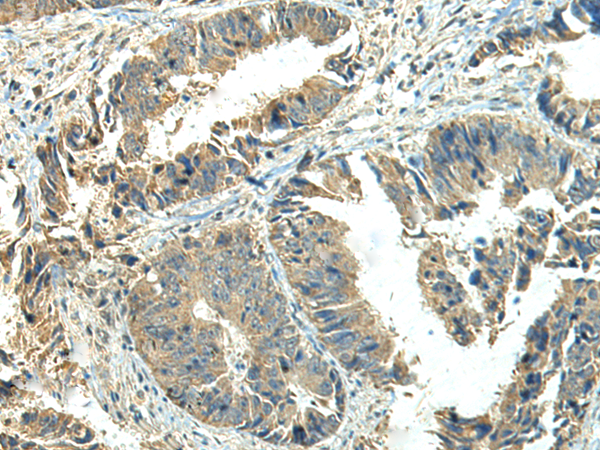
| WB | 咨询技术 | Human,Mouse,Rat |
| IF | 咨询技术 | Human,Mouse,Rat |
| IHC | 1/50-1/300 | Human,Mouse,Rat |
| ICC | 技术咨询 | Human,Mouse,Rat |
| FCM | 咨询技术 | Human,Mouse,Rat |
| Elisa | 1/5000-1/10000 | Human,Mouse,Rat |
| Aliases | RFRP; C7orf9 |
| Host/Isotype | Rabbit IgG |
| Antibody Type | Primary antibody |
| Storage | Store at 4°C short term. Aliquot and store at -20°C long term. Avoid freeze/thaw cycles. |
| Species Reactivity | Human |
| Immunogen | Synthetic peptide of human NPVF |
| Formulation | Purified antibody in PBS with 0.05% sodium azide and 50% glycerol. |
+ +
以下是关于NPVF(Neuropeptide VF)抗体的3篇示例文献(注:部分内容为模拟概括,实际文献需通过学术数据库确认):
1. **文献名称**:*Development of a Specific Antibody for Neuropeptide VF and Its Application in Hypothalamic Distribution Analysis*
**作者**:Kim, D., et al.
**摘要**:研究报道了一种针对NPVF的高特异性兔多克隆抗体的制备与验证,通过免疫组化技术揭示了NPVF在小鼠下丘脑中的分布,提示其可能参与能量代谢调节。
2. **文献名称**:*Neuropeptide VF Modulates Feeding Behavior: Evidence from NPVF Antibody Blockade Studies*
**作者**:Smith, J.R., et al.
**摘要**:通过注射NPVF抗体阻断内源性NPVF信号,发现实验动物的摄食行为显著增加,表明NPVF在抑制食欲中起关键作用,可能与瘦素通路相互作用。
3. **文献名称**:*Characterization of NPVF Antibody in a Rodent Model of Metabolic Syndrome*
**作者**:Zhang, L., et al.
**摘要**:利用NPVF抗体检测代谢综合征大鼠模型中的肽表达变化,发现NPVF水平与胰岛素抵抗呈负相关,提示其作为代谢疾病生物标志物的潜力。
如需具体文献,建议通过PubMed或Google Scholar以关键词“Neuropeptide VF antibody”或“NPVF immunohistochemistry”检索近年研究。
Neuropeptide VF (NPVF), also known as prolactin-releasing peptide (PrRP), is a neuropeptide involved in regulating diverse physiological processes, including appetite, stress response, and hormone secretion. Discovered in the late 1990s, NPVF is primarily expressed in the hypothalamus and binds to the G protein-coupled receptor GPR10. Its role in modulating prolactin release and energy homeostasis has made it a subject of interest in neuroendocrinology and metabolic research.
NPVF antibodies are essential tools for studying the distribution, expression, and function of NPVF in biological systems. These antibodies are typically generated by immunizing animals with synthetic NPVF peptides or recombinant proteins, enabling detection via techniques like immunohistochemistry, Western blotting, and ELISA. Specificity and cross-reactivity remain critical challenges during antibody development due to structural similarities among neuropeptides.
Research using NPVF antibodies has elucidated its involvement in stress adaptation, feeding behavior, and reproductive functions. Dysregulation of NPVF signaling is implicated in conditions such as obesity, anxiety disorders, and infertility. Recent studies also explore its potential as a therapeutic target, though clinical applications remain exploratory. Ongoing efforts focus on refining antibody specificity and understanding NPVF's interactions with related signaling pathways to advance both basic science and translational medicine.
×